- Musk supports creating a free trade zone between Europe and North America.
- Escalating tariffs could increase tensions between the US and EU.
- Economic pressures mount as Europe considers counter-tariffs.

Elon Musk has urged the establishment of a zero-tariff trade agreement between the United States and Europe during a virtual session with Italian Deputy Prime Minister Matteo Salvini.
Musk’s proposal for a zero-tariff system aligns with his advocacy for free-market policies. With the backdrop of rising tariffs under Trump’s administration, the geopolitical landscape presents challenges to this vision. Musk emphasized the benefits of a zero-tariff trade system in a meeting with Italian policymakers, suggesting it could improve transatlantic economic relations.
“I hope it’s agreed that both Europe and the United States should move ideally, in my view, to a zero-tariff situation, effectively creating a free trade zone between Europe and North America,”
Musk stated, highlighting his broader aim for increased economic integration between Europe and America.
Musk’s comments coincide with President Trump’s recent tariffs on European goods, which sparked concerns of a potential trade war. These measures could heavily impact affected industries and cause significant economic disruptions in Europe.
The 20% tariff on EU goods by Trump’s administration draws mixed reactions from market sectors, with potential countermeasures from Europe. Increasing complexity around trade policies poses a risk to global market stability.
Historical patterns of market reactions to trade disputes indicate possible volatility across financial and commodity markets. Musk’s suggestions for a unified trade zone highlight the advantages of free trade, aiming to alleviate market tensions.
Trade tensions often drive interest in alternate markets; however, the immediate impact on cryptocurrencies remains undefined. Historical precedents suggest economic uncertainty can lead to increased reliance on digital assets as market hedges.


























